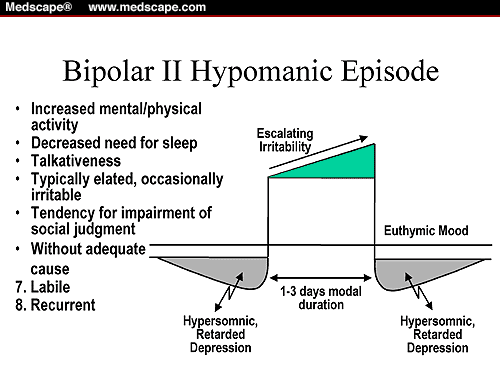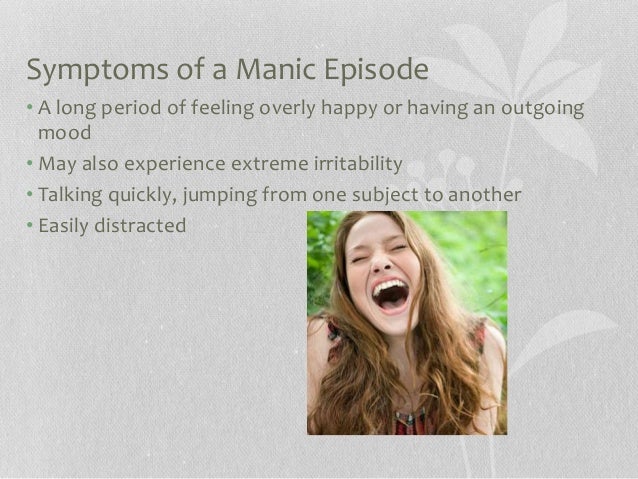
It's thought using a combination of different treatment methods is the best way to control bipolar disorder.
#Bipolar disorder manic episode how to
psychological treatment – such as talking therapy, which can help you deal with depression, and provides advice about how to improve your relationships.learning to recognise the triggers and signs of an episode of depression or mania.medication to treat the main symptoms of depression and mania when they occur.medication to prevent episodes of mania, hypomania (less severe mania) and depression – these are known as mood stabilisers and are taken every day on a long-term basis.The following treatment options are available: They aim to control the effects of an episode and help someone with bipolar disorder live life as normally as possible. However, there are several options for treating bipolar disorder that can make a difference. The high and low phases of bipolar disorder are often so extreme that they interfere with everyday life. However, you may also experience symptoms of psychosis, where you see or hear things that aren't there or become convinced of things that aren't true. You may feel very creative and view the manic phase of bipolar as a positive experience. Not feeling like eating or sleeping, talking quickly and becoming annoyed easily are also common characteristics of this phase. You may spend large amounts of money on things you can't afford and wouldn't normally want. Maniaĭuring a manic phase of bipolar disorder, you may feel very happy and have lots of energy, ambitious plans and ideas. Alternatively, visit the Samaritans website. You can talk to them 24 hours a day, 7 days a week.
#Bipolar disorder manic episode free
If you want to talk to someone confidentially, call the Samaritans, free of charge, on 116 123. If you're feeling suicidal or having severe depressive symptoms, contact your GP, care co-ordinator or local mental health emergency services as soon as possible. You may initially be diagnosed with clinical depression before having a future manic episode (sometimes years later), after which you may be diagnosed with bipolar disorder.ĭuring an episode of depression, you may have overwhelming feelings of worthlessness, which can potentially lead to thoughts of suicide. Unlike simple mood swings, each extreme episode of bipolar disorder can last for several weeks (or even longer), and some people may not experience a "normal" mood very often. Symptoms of bipolar disorder depend on which mood you're experiencing.

People with bipolar disorder have periods or episodes of: Published by Elsevier B.V.Bipolar disorder, formerly known as manic depression, is a condition that affects your moods, which can swing from one extreme to another. Further studies are encouraged to continue looking for specific factors that distinguish the antecedents of these two disorders.īipolar disorder Cohort studies First episode Prodrome Schizophrenia.Ĭopyright © 2023.

The initial prodromes are more alike than distinct. The psychiatric antecedents of SZ and BD usually start during adolescence, overlap, and present in unspecific ways. Both groups had similarly high rates of substance use (SZ 74 % vs BD 74.3 %), prescription of antidepressants (SZ 46.6 % vs BD 55.4 %) and stimulants (SZ 30.5 % vs BD 22.9 %). BD also had more affective symptoms, nightmares, and panic attacks before the first episode. BD was more common in white population and had higher rates of depressive and adjustment disorders prior to first episode. We found that SZ and BD have overlapping antecedents, but SZ was more common in males and in foreign born and had more learning deficits before the first episode.

The duration of the initial prodrome (time from first mental health visit to first episode) was similar for both groups (SZ 8.3 ± 6.2 years vs BD 7.3 ± 5.9 years). The mean age at first visit for mental health reasons was 12.3 ± 6.3 years for SZ and 13.9 ± 5.6 years for BD. We identified 205 cases with first episode psychosis or mania (SZ = 131 BD = 74). We confirmed each case using DSM-5 criteria and obtained the psychiatric antecedents. Using the Rochester Epidemiology Project, we searched for residents of Olmsted County that had a diagnosis of SZ or BD. We aim to compare the psychiatric antecedents of schizophrenia (SZ) and bipolar disorder (BD).


 0 kommentar(er)
0 kommentar(er)
